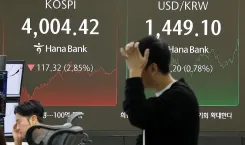Will Indian Markets Surge in Q3 FY26? Insights from Morgan Stanley

Synopsis
Key Takeaways
- Indian stock markets are poised for potential growth.
- Government spending and RBI support are key drivers.
- Corporate earnings may exceed expectations.
- Global factors remain a significant risk.
- Long-term reforms enhance investor confidence.
Mumbai, June 27 (NationPress) The prospects for the Indian stock markets appear to be more favorable for growth rather than decline in the third quarter of the financial year 2026 (Q3 FY26), according to a note released by Morgan Stanley on Friday.
The global brokerage maintains a positive outlook on Indian equities, projecting robust growth indicators, favorable actions from the Reserve Bank of India (RBI), and unexpectedly strong corporate earnings to elevate the markets starting in July.
As per the firm's analysis, India exhibits signs of consistent progress. Increased government expenditure is noted, along with the RBI's shift towards a more accommodating or 'dovish' policy approach.
This, paired with declining inflation rates, fosters a conducive setting for the stock market.
Furthermore, the brokerage anticipates that reduced interest rates will enable banks to extend more loans, thereby enhancing lending growth.
If global uncertainties diminish, Indian firms may also ramp up investments in new ventures.
A significant catalyst could be the forthcoming corporate earnings season. Morgan Stanley predicts that numerous companies will surpass market forecasts, driven by lower base comparisons, improved operational efficiency, and consistent consumer demand.
Looking ahead, the RBI might implement a 25 basis point interest rate cut in the fourth quarter, which would further bolster market sentiment.
Nonetheless, the brokerage cautioned that international factors remain critical in influencing India's market dynamics.
Global tensions, shifts in trade policies, or a downturn in developed economies could adversely affect Indian stocks.
While India is generally perceived as a relatively stable market, a significant global sell-off could still have repercussions for domestic equities.
For instance, a steep decline in oil prices could signal global economic issues, which would not bode well for the markets.
Despite these challenges, Morgan Stanley believes that strong engagement from retail investors and sustained foreign interest will help mitigate any downturns.
Indian equities also gain from a ‘scarcity premium’ alongside long-term reforms like GST modifications and infrastructure enhancements, further solidifying investor confidence.
Even though current valuations are elevated compared to historical standards, the brokerage considers them warranted due to the promising earnings outlook.
In the long run, India's stable policies and growth prospects position it as one of the most appealing markets among emerging economies, according to Morgan Stanley.









